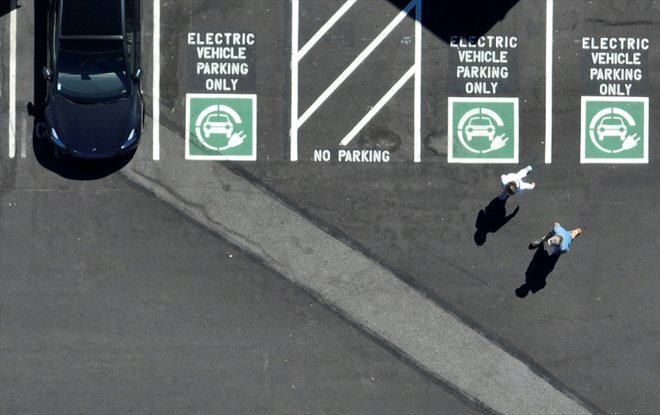Joe Biden, in Utah, on August 10, 2023 (AFP/Archives/Jim WATSON)
A year after its entry into force, the grand plan for the climate (or IRA) wanted by President Biden is beginning to produce its effects on American soil but still arouses many concerns among the main allies in Asia and Europe.
The objective of the plan, which includes 370 billion dollars in subsidies and tax reductions, is simple: to allow the United States to develop an industry both for the production of clean energy and for the development of electric vehicles.
This plan is “proof that the United States is really getting started”, underlines Joshua Meltzer, researcher at the Brookings Institution, while the European Union (EU) and China, in particular, were already supporting their energy transition.
A symbolic measure of this ambition, the purchase of an electric vehicle is now subsidized up to 7,500 dollars, when the vehicle, like its components, is assembled in North America.
Originally, the idea was even more restrictive since it had to be “made in the USA” but the strong reaction of Canada and Mexico, who saw it as a measure going against the free trade agreement existing between the three countries (ACEUM), forced Washington to review its copy.
“The latest versions of the text were negotiated in secret and hastily to obtain the necessary votes, but they got it wrong”, recalls Jeffrey Schott, principal researcher for the PIIE, with “unintended consequences for some of our allies relatives”.
The latter quickly gave voice, like South Korea which feared to see its car manufacturers excluded from the subsidy of 7,500 dollars.
The same thing in Japan, even if the Japanese manufacturers are already widely established industrially in North America, but the specificities of the subsidy, on the origin of certain critical materials, have fueled fears.
Fears dispelled by the signing, at the end of March, of an agreement between the two countries making eligible vehicles incorporating components or materials from or processed in Japan.
“The Treasury had to be creative in the way the law should be put in place,” says Mr. Schott, playing in particular on what is a free trade agreement “whose definition is broader in the United States. United than elsewhere”.
– “Significant investments in the United States” –

An electric car parking lot in California, June 28, 2023 (GETTY IMAGES NORTH AMERICA/AFP/Archives/JUSTIN SULLIVAN)
A similar agreement is being negotiated with the European Union, where the concern this time is to see green investments fleeing the continent to take advantage of the aid provided by the IRA, while European industry has suffered for years from unfair practices. Chinese, according to Brussels.
Not enough, however, to dispel fears because “Europe already has to face rising energy costs because of the war in Ukraine. In this, the IRA comes on top of other factors creating competitiveness problems for Europe. ‘EU”, recalls Joshua Meltzer.
At the end of July, a study carried out by three economists from the European Central Bank (ECB) pointed out that the impact of the IRA could be severe for certain European sectors, with a drop of 10 to 40%, depending on the scenarios, in exports in electrical and optical equipment. In total, it would be a loss of production of 0.5% to 3% for the European economy.
In the meantime, the effects of the IRA are already being felt in the United States where 110 billion dollars of investment have been made, according to the White House.
“The investments announced in the last twelve months exceed those made in the previous eight years”, assured in a report published in early August the president of the association for clean energy, Jason Grumet.
“We are seeing significant investments in the United States and this is undoubtedly done partially to the detriment of investments in Europe or Asia”, estimates Mr. Meltzer even if “investments are progressing everywhere in the world”.
This could encourage the EU and Asian countries to increase their aid in turn in order to avoid dropping out. For several months, the International Monetary Fund (IMF) has been warning about the risk of a “subsidy war”, costly for public finances and with a limited positive impact for economies.
A fear that Jeffrey Schott does not share, however, who believes that “the political risk (which is associated with it) seems to be growing and companies cannot afford to wait who will be the best bidder”.
But “if you are in an energy-intensive sector, currently the United States is more and more attractive”, concedes Joshua Meltzer.
© 2023 AFP
Did you like this article ? Share it with your friends with the buttons below.




